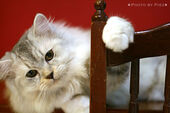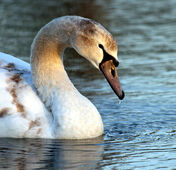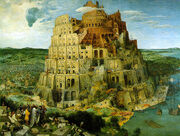La Langua Norelîenne
Overview:

Bonne'ouîe!
Setting[]
Norelian is a Romance language spoken on the island of Noreliand (English)-or Norelîa (Norelian) off the coast of Western Europe. Norelîa is the child of ancient Atlantis, as Italy is of Rome. Noreliand is not far away from France, so there are many cognates with French. They also have a few dreaded silent letters, the most obvious one is that many words have a silent 'e' on the end. If an 'e' at the end of a word isn't accented- é - then it simply isn't pronounced. Norelîenne, as native speakers call it, is based of Latin, French, English, Spanish, and some Italian. I'm hoping to make to make Norelian into a fully functional, modern language full of words that are aesthetically pleasing to both the eyes, and the ears. I also want to make the fictional island of Noreliand have a unique culture, and mindset which the language will reflect. Norelîenne isn't nessecarily meant to be an international language, but if anyone ever wanted to learn it or spread the language, they wouldn't start out without a base culture. Norelian isn't trying to be the next Esperanto or Volapük, though I definitely wouldn't mind!
- Note that my conlang is still in its infancy, and that I will probably continue to develop and change it.
I also ask that no one edit my article in a drastic way, and to please ask for my permission before editing.
Basic Grammar[]
Here is a basic grammar:
l'Alphesse- the Alphabet[]
Aa Bb Cc Dd Ee Ff Gg Hh Ii Îî Jj Ll Mm Nn Oo Pp Qq Rr Ss Tt Uu Vv Xx Yy Zz
- Norelîenne also uses the following letters :
á é ï í ó ú
Pronunciation[]
vowels[]
a as in saw
e as in lay; e as in let
i as in him
î as in sleep
o as in low
u as in fun
ou as in you
ai as in my
au as in cow
oy as in soy
eau as in go
consonants[]
b, d, f, h, l, m, n, p, r, s, t, v, x, y, z, similar to English; the rest:
c can sound hard- cat-, or soft- century-
g can also sound hard- grass-, or soft like 'j'
- for both c and g, it really just depends on the word (I wanted it to be like many natural languages in this).*
j has a sound a sound similar to the 'z' in azure
q has the sound of 'cw' as in queen, though 'que' sounds like a hard 'c' at the end of words-musîque, or republîque.
Articles[]
Nouns do not have gender (masculine, feminine, or neuter) in Norelîenne, although there is evidence that they did at one time. There is one definite article:
la which corresponds to the English the
When la comes before a vowel sound, it condenses to the front of the word, and it is slurred together when pronounced: la + Alphesse = l'Alphesse
la + anîmale = l'anîmale
When la comes before a plural nouns such as chattes, it turns into les:
la + chattes = les chattes
la + maisones = les maisones
There is also one indefinite article, that takes two forms depending upon the following sound of the noun:
un or una which correspond to the English a
The form of a, un is used before vowel sounds:
un anîmale, never una anîmale
un apis, never una apis
The form of a, una is used before all consonant sounds:
una chîen, never un chîen
una boullen, never un boullen
Pronouns[]
Ja- I
moi- me
vou- you (informal)
anou- you (polite)
il- he
elle- she
zam- it
aullîe- we
vou'alles- you all
lemme- they
also pronouns, but not major ones with unique conjugations:
nérîe- one (as in: -One could go there, but I don't think its very safe.)
nérîmenne- oneself
Jaménne- myself
vourez- yourself (informal)
anouze- yourself (polite)
Possessive pronouns[]
Possessive pronouns used to refer to one object are:
mon- my
vour- your (informal)
anour- your (polite)
ilour- his
ellour- her, hers
aullîne- our, ours
vou'allemes- you all's
lemmure- their, theirs
Possessive pronouns used to refer to more than one object:
mes- my
tois- yourself (informal)
anois- yourself (polite)
illése- his
ellése- hers
aullése- our
vou'alleméne- you all's
lemmése- their
Adjectives[]
In Norelian, like in other Romance languages the adjective goes before the noun. For example it's not a blanque chîen, it is chîen blanque. This rule holds true- (la donna bella, la fleur amariss...) -until one uses numbers to describe a noun. What if you wanted to say two days? You would say: dua ares, not ares dua.
The same is true when using possessive pronouns: «Mon maison etenne...»- "My house is..." «Aullîne aré, etanne aresîe! »- "Our day is today!"
It's really not that difficult with adjectives, you just have to remember the rules. (Tré donnas, la ellîe papilîos.)
Here is a list of some common adjectives you'll be likely to come across (not in alphabetical order):
bella- pretty, beautiful
adorablé- adorable, cute
blonde- blonde (used for males, and females)
ruberése- red haired
brunette- brown-haired
noirése- black-haired
blanquerése- white-haired
grîsarése- gray-haired
féante- ugly
amusánte- fun, funny
intelligénte- smart, intelligent
bonne- good
mauvaiz- bad, incorrect
terrîblé- terrible
horeurmén- horrible
nouveau- new (used for inanimate objects- l'auto nouveau- the new car)
nouvelle- new (used for people and animals- «elle etanne una donna nouvelle »- "she is a new woman")
ancîen (this 'c' sounds like 'sh')- ancient, old- could be used as an insult
vîalle- old, out-of-date
bonnamuseé- wonderful, entertaining
Verbs[]
Most verbs in Norelian conjugate according to a set pattern, these are called regular verbs.
A good exaple of a regular is: parler, which means to speak. (Nouns are always talked about in their infinitive form, which means they are unconjugated.)
Here is how it conjugates:
Ja parlé - add é
vou/anou parlé -add é
il parlene -add ene
elle parlene -add ene
aullîe parlese -add ese
vou'alles parlîe -add îe
lemme parlanne -add anne
Dictionary[]
(really more of an index of words)
Everyday Expressions[]
Greetings[]
Felicîtachánne- greetings, or congratulations; considered polite and friendly.
Anjoure- hello, greetings; can be used in a formal or informal situation.
Jourre- hi, hey; informal.
Bonne'ouîe- welcome!
bonne azré- good morning
bonne aré- good day
bonne adune- good evening
bonne nuît- good night
Goodbyes[]
Arvoir- goodbye; both polite and friendly
reprîs- goodbye; the most formal
adîu- bye
chîanne- goodbye; interchangable with arvoir
thinan azré- have a good morning
thinan aré- have a good day
thinan adune- have a good evening
thinan nuît- have a good night
bonne chance- good luck
Foods[]
A section of common foods and meals:
Juvandé- breakfast
Almersé- lunch
Dîsnerre- dinner
noitrîure- food
comîrre- meal
Vegetables[]

les tomattes
legúme- vegetable
concombre- cucumber
tomatté- tomato
abolaza- pumpkin
brocalle- broccoli
choufleur- cauliflower
celsau- celery
aubergîne- eggplant
onîane- onion
Fruits[]

les fraises
fruita- fruit
pomme- apple
cherîse- cherry
fraise- strawberry
péche- peach
pereau- pear
susîne- plum
pomme d'amour- pomegranate
cîtrone- lemon
cîtrone-vert- lime
raison- grape
melón- melon
melón-saffîre- watermelon
banane- banana
narange- orange
Meal Courses[]

chalevón
The meal courses are listed in the order traditionally served in Norelîa.
soux et salade- soup and salad
entrée- main course
chalevón- dessert
frommage et vînne- lastly, the cheese and wine course
Les Entrées[]
boef- beef
cizé- chicken
porque- pork
stéque- steak
pîscarrde- fish

stéque
Chalevón![]
pastelle- cake
cîblerre- pie
pastellîna- cookie
pastellette- cupcake
parffé- parfait

la frappe bonne
créme glacée- ice cream
tiramîsoux- tiramisu
glacétte- ice pop
sundé- sundae
frappe- shake or malt
Days, Months, & Seasons[]
Even though the Norelians use the Western Gregorian calendar, they have retained their own unique names for the months of the year and the days of week.
Days of the Week[]
Elaré- Monday
Anaré- Tuesday
Île'aré- Wednesday
Aldaré- Thursday
Fraré- Friday
Venîaré- Saturday
Minelle'aré- Sunday
aré- day
Months[]
Narvinîyé- January
Lárquella- February
Vîressé- March
Arquessé- April
Fleuressé- May Belorné- June
Thermîe- July
Urîmé- August
Yavé- September
Tuavré- October
Novasarré- November
Uîcharré- December
boullen- month
The Seasons[]

Yavaré
Prîmavera- spring
Aistharé- summer
Yavaré- autumn
Hiver- winter
ou'îan- season
Colours[]
blanque- white

una chîen blanque
noir- black
ruber- red
cairule- blue
amariss- yellow
vert- green
ajurre- purple

les fleurs ajurre
saffîre- pink
grîs- gray
brun- brown
tîlle- turqoise
argent- silver
mallorne- gold
orange- orange (colour only, not the fruit!)
corella- colour
Numbers[]
0- voiché 1- una 2- dua 3- tré 4- quatra 5- quînqua 6- saïse 7- septîa 8- ellîe 9- nover 10- desse 11- undanesse 12- duanîs 13- tredesse 14- quatradesse 15- quînquadesse 16- sadesse 17- septadesse 18- elîdesse 19- noveradesse 20- vigintîe 21- vigintîe-una 22- vigintîe-dua 30- tragentîe 40- quatragentîe 50- quagentîe 60- saigentîe 70- septegentîe 80- ellagentîe 90- novagentîe 100- sîenna
noumra- number
Animals[]
Here is a very short list of some common animals:

la chat adorablé
chat- cat

la quasana bella
==
chîen- dog
abris- bird
apis- bee
papilîo- butterfly
pîscarre- fish
ursra- bear
gallîna- chicken
vaca- cow
balerge- rabbit
froppe- frog
quasana- swan
anîmale- animal
Countries and Nationalities[]
A list of some major countries in Europe, and around the world
Norelîa- Noreliand
Norelîenne- Norelian language or people
France- France
Francésse- French language or people
Éspagna- Spain

Aullîne Éa bella!
Éspanîenne- Spanish language or people
Italîa- Italy
Italîenne- Italian language or people
Alemanîa- Germany
Alemánne- German language or people
Ellénîa- Greece
Ellanîenne- Greek language or people
Mascovîe- Russia
Mascovîte- Russian language or people
Anatolîa- Turkey
Anatolîenne- Turkish language or people
Îsrelle- Israel
Îsrellîenne- used for both the Hebrew language and the citizens of Israel
Arabîya- Saudi Arabia, or the Arabian Peninsula
Arabîe- Arabic language or Arab people
Indîya- India
Indîenne- Hindi language or Indian people
Cathé- China
Cathanîenne- Mandarin Chinese language, or Chinese people
Coréa- Korea
Corîenne- Korean language or people
Chapón- Japan
Chaponîenne- Japanese language or people
Amérîca- America
Les Estates Unîté- The United States (official name)
Amérîcanne- American English, or American citizens
Britannîa- Britain
La Royamé Unîté- The United Kingdom (Britain's official name)
Anglése- the English language or British people
Mesîqué- Mexico
Mesîcanne- Mexican Spanish or Mexican people
Brasîlle- Brazil
Brasilîenne- Brazilian Portuguese or Brazilian people
Portugalle- Portugal
Portugesanne- Portuguese language or people
Canîda- Canada
Canadîenne- Canadian English or Canadian people
Quebéque- Quebec
Quebécois- Quebec French or people from Quebec
la Boté- the world seen from a human point of view
la Éa- the Earth
Îurope- Europe
Afrîque- Africa
Agîa- Asia
America-Boréale- North America
America-Austurale- South America
Australîa- Australia
Antarde- Antartica
Boréa- north
Austra- south
Orîente- east
Ocîdente- west
la terra- a country or land
una nationalîté- a nationality
langua- language
una dorîende- a people
Norelian Customs[]
Though it may not be that important, the imaginary island of Noreliand has its own unique customs and way of looking at the world. I will put here whatever I feel is important (most of it made up as I go along!), from ancient folk customs to the modern-day government.
Government and Quick Facts[]
Official Name: The Kingdom of Noreliand, and the United Norelian Empire
Capital City: Navarra
Population: about 183 million (183,000,000)
Size: about 3 and a half million sq. kilometers
Official language: Norelian (Portuguese is also widely used in the immigrant communities from Portugal and Brazil)
Type of Government: a hereditary monarchy
Head of State and Government: the Monarch (king or queen)
Branches of Government:
1. The Monarchy- makes laws, judgements, and executive decisions.
2. The Parliament- makes laws, decides some judgements; members of Parliament elected from the common class of citizens and helps the monarch govern fairly; the leader of the Parliament is called the Premier, and works closely as an advisor to the monarch.
3. The High Court- makes judgements about how laws are to be interpreted, and helps to decide difficult cases.
Divisions of Noreliand[]
Though the overseas territories may look somewhat independent, they all recognize Noreliand's authority, and influence over them. Noreliand has more power than the other 5 kingdoms. Noreliand is first divided into 6 major divisions or kingdoms (royamés)
1. Norelîa
2. Quellanés
3. Afrîque-Ocîdentale
4. Genesáu
5. Hivernîa
6. Catheranîs
Example texts[]
" La Torre de Babélle " or The Tower of Babel text will go here soon...

la Torre de Babélle
Chat-noir178 01:38, 27 March 2009 (UTC)
